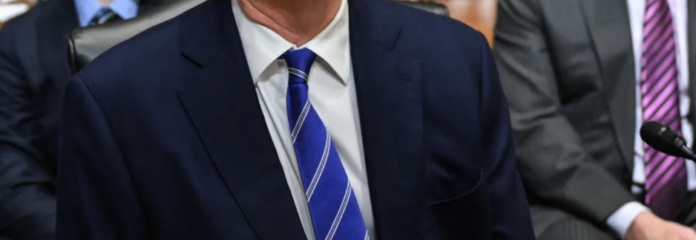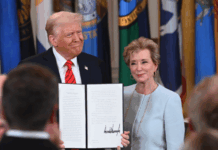Well, buckle up, because it turns out that draining the swamp isn’t just a metaphor anymore—it’s now a budget line item. Treasury Secretary Scott Bessent, in his recent sit-down with Tucker Carlson, laid out what might be the most unapologetically practical economic strategy we’ve seen in decades. The formula? Less bloated bureaucracy, more manufacturing jobs, and a heaping side of tariffs. Cue the outrage from the ivory tower economists and D.C. cocktail party circuit.
Let’s start with the layoffs. Apparently, the Department of Government Efficiency—DOGE, for those in the know and not to be confused with the meme coin—is trimming the fat with more gusto than a CrossFit coach on a New Year’s resolution. Hundreds of thousands of federal employees have been let go, with some being forcibly reinstated by activist judges, but the push continues. Naturally, this has the usual suspects in the media acting like the sky is falling. Oh no, what ever will we do without seven layers of mid-level management at the Department of Redundant Redundancy?
Bessent’s logic is pretty straightforward, and frankly, refreshing: trim the federal workforce, redirect those people toward rebuilding American manufacturing, and stop hemorrhaging tax dollars to fund paper-pushing positions that do little more than gum up the works. According to him, these folks aren’t being discarded—they’re part of the re-shoring solution. Say what you will, but at least someone is thinking about how to bring jobs back to America rather than just issuing vague campaign promises with no delivery mechanism.
Look I’ve been as critical of tariffs as anyone but if the long term vision is domestic Nike sweatshops filled with fired DC bureaucrats, I’m willing to listen https://t.co/CmsJ7bx5vk
— David Burge (@iowahawkblog) April 7, 2025
Of course, the economic commentariat is having a meltdown. Professors and think-tankers are tripping over themselves to declare that tariffs don’t work, that cutting spending won’t help, and that the sky will fall by lunchtime tomorrow. It’s like they haven’t realized they’ve been wrong before—often, loudly, and at great national expense. These are the same people who told us that NAFTA would be a win-win, that shipping jobs overseas was “inevitable,” and that printing trillions wouldn’t cause inflation. How’d all that work out?
Meanwhile, Trump’s tariff strategy just launched over the weekend, slapping a flat 10% on all imports and gearing up for “reciprocal” tariffs that, for once, tell the rest of the world: we’re done being the chump at the global trade table. The critics scream about trade deficits like that’s the holy grail of economic metrics, but everyday Americans care more about whether their town still has a factory and if their kids can get a job that doesn’t involve an app and a bicycle.
Yes, the labor market is tightening, but Bessent is right—there’s a reset happening. For decades, we outsourced our industrial base, padded the government payrolls, and ran up a tab we couldn’t pay. Now, under Trump, we’re pulling the plug on that model. And surprise, surprise: when you cut spending and generate revenue through tariffs, bond yields start to dip. As Bessent pointed out, the 10-year Treasury dropped below 4%—a signal that, contrary to liberal media hysteria, markets aren’t running for the hills. In fact, they’re starting to get the picture.
Sure, some of the bureaucrats now looking for work may not slide effortlessly into a steel mill or an assembly plant, but let’s not pretend federal job security was a birthright. The private sector adapts. If we’re serious about rebuilding America, it’s going to take people willing to build something more than spreadsheets and PowerPoints.
Elon Musk stepping down from his role at DOGE by May, claiming he’ll have slashed a trillion dollars in federal spending by then, might sound like Silicon Valley hyperbole—until you realize this administration is actually doing the things D.C. insiders have been talking about for decades. Less talk, more action. It’s almost as if accountability is back in fashion.
Almost 70 countries have now approached us wanting to help rebalance global trade.
On behalf of @POTUS, I’m glad to join @USTradeRep to open talks with Japan as we work to enact the President’s vision for a new Golden Age of Global Trade.pic.twitter.com/PGUGjh7JkH
— Secretary of Treasury Scott Bessent (@SecScottBessent) April 7, 2025
So yes, the professional class is rattled, the media is howling, and the left is dusting off their fainting couches. But out here in the real world? It’s starting to feel like someone’s finally turning the ship around.







